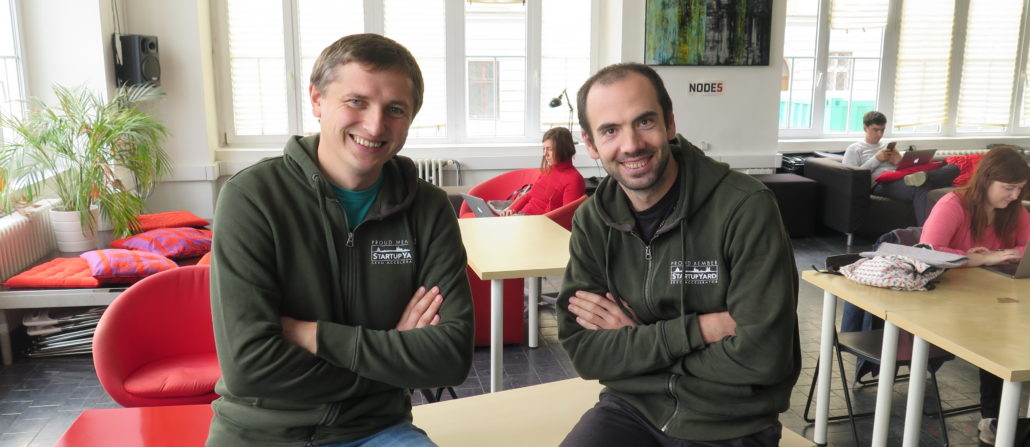The Sales Trainer’s New Best Friend: MindBoxVR Reveals Open Beta
Sales Trainers know the value of real world experience. But how can they provide it to large groups of trainees in a limited time? Mindbox VR, a StartupYard Alum, has the solution, and any sales trainer can use it today. Peter Tomasovic, CEO and Co-Founder of Mindbox VR, is a StartupYard alum from Batch 8, focusing on a VR solution for sales and customer service training. Mindbox started out as a tool to help mental health professionals treat the symptoms of phobias, such as a fear of heights, or of insects, using VR simulations as a form of immersion therapy.
During the StartupYard program, the Mindbox team hit upon sales training as a novel use for their VR technology, which allows non-programmers to quickly and easily create scenarios for sales and customer service training sessions. The biggest advantage of using VR for these purposes is that it simulates a real-life experience, and can also be used to generate statistical data that sales trainers can work with to improve the performance of trainees with time. Plus, MindboxVR can be used to train many people at once, and even after the training for skill reinforcement.
You can check out MindBox’s open beta now by clicking here.
I talked with Peter this week to find out how MindBox got to where they are.
What have been your biggest challenges since the StartupYard program? How have you solved these?
Our biggest challenge has really been to find out what our customers really need from Mindbox. Separating the “nice to have,” from essential is super important to be able to deliver something that works on the first try. Our customers don’t always know exactly what will be the most necessary features, because most have never used this technology before, so it’s a process of discovery for all of us.
When we were at StartupYard, lots of companies wanted to work with us on the process of validation and experimentation, but in the end they want to have a useful delivered product, so you have to get it right.

Slovak entrepreneurs Peter Tomasovic (right), and Andrej Rybovic (left), Co-founders of Mindbox VR.
Another challenge was to hire new people versus do-it-yourself. When we counted costs for new people, onboarding, learning them technology, understanding product specification, we decided to develop the first version ourselves and use external experts only when solving specific problems or for feedback. This allowed us to move more quickly short term, but it will be a challenge then to scale up the team and delegate when demand is increasing.
How did you arrive at the set of features you have now, and what do you plan for the next iteration?
For the current set of features, two sources of information were most important:
- companies and training agencies (customers)
- our advisors
In the case of potential customers, the Pareto principle worked for us. We met with lot of companies, 80% of them gave us “standard feedback” and lot of brainstorming, which was mostly distracting. The other 20% gave us what we have now – a set of features, idea of the scenarios that could be interesting, company use cases. And what is important, is that we are still in touch with these companies and they are now strategic partners.
It is a learning process to understand which prospects are going to be your real customer, and which are going to distract from the development process. We are still learning this.
Our advisors gave us key support here. During StartupYard we met 3 great people, Serge Dupaux, Jana Zurkova, and Silvia Pánková – experts in the fields of HR, business development and sales. We have regular meetings, we had a one day workshop, where we defined a customer journey with the key product features, etc.
For the roadmap and next iterations, we have a set of features from meetings with companies or analysis of competition. But most important for us is to make pilot implementations and find out which features are really crucial. That is the reason we are right now focusing on selling and looking for partners.
What kind of people can most benefit from MindBox VR?
MindBox VR is like a swiss knife for every sales trainer in customer service, product training and sales training.
Unlike most training solutions, MindBox VR is about interaction and immersion. It allows a trainee to interact with voice and reply to a virtual customer. The physical act of doing the interactions repeatedly is many times more effective than just listening to a speaker or reading about the techniques.
Once a training program is created by a sales trainer in Mindbox VR, it can be started on any Android device, but also in a VR headset. Currently we are supporting mobile VR headsets like Gear VR or Google Daydream. This makes it really easy for a sales trainer to deliver their program with whatever equipment they or their clients can afford.

If you want to train customer service, you can prepare a training where virtual customer asks you typical questions. They can be standard, like questions about warranty, transport, returning product. Or the can be more “tricky”, like “This product is very cheap. Isn´t it a fake?”. The trainee has to reply to such questions. The mix of standard and non-scripted interactions helps employees to internalize the company policies and best practices, and to be more comfortable in unexpected situations.
So why should a sales trainer use VR instead of more traditional methods?
The key is repeatability and a systematic approach. We all “know” how we would act in some hypothetical situation. But in actual truth, we don’t really. When you are in a real life scenario, there are a million complicating factors to consider, so having the learned experience is the best way to help people be prepared. However, simulations using real people are often less realistic. Co-workers know each other and are often friends. Co-workers want to help each other, naturally.
When you do play-acting in sales training, the situation is never the same for each participant. It might work for some, but not for all. VR allows us to replicate a specific situation very precisely, and apply systematic testing and feedback on performance. The human approach is still critical, as we are talking about soft human skills, but VR can support this with a data driven approach on top. We don’t want to replace trainers or in-person training, but to augment it with easy-to-use software tools.
Moreover, sales trainers can set keywords in conversation – critical words that must be said by the trainee when replying. Practice makes perfect, is the saying. Most important about training with MindBox, is that the trainee has to speak, and really answer questions. It’s not just a dumb script, but a simulation that feels real, and that can change according to what the sales trainer plans.
This way, you are not developing only knowledge (like when he is reading or watching a slideshow) but also skill, because you have to think about the information in a sentence and actually come up with the right answer for that specific situation.
After the training, trainers will see statistics, reports and complete transcripts of communications with customers, so they can deeply understand what is working, and what needs more work.
Are you looking for funding or more partners? Who should contact you?
We are in touch with some VCs and investors, but for them it’s most relevant to have traction and signed contracts with customers. That’s especially true because this technology is so new to the market, and the market has to be proven.
Therefore most important for us right now is to acquire more early customers and partners who want to really improve their training processes and be among the best in the industry. We have an open beta version, and sales trainers can start training from day one.
We also have 2 example trainings, which a trainer can easily adjust for company needs and start training quickly to see the results. The most relevant first contacts are HR people responsible for corporate training, learning and development, as well as independent professional sales and customer service sales trainers. Heads of sales and those in charge of personal development programs will also find a lot of value in what is available today.
StartupYard is Looking for Founders!
Are you a startup founder ready to accelerate your business with CEE’s best network of top mentors? StartupYard’s Batch X Open Call has started.
Our focus this round will be on Automation, Blockchain, and the Future of Work. If you’re working on a hard problem involving Machine Learning, IoT, Identity, Payments, Security, or Decentralization, then we want to hear from you. Find out if StartupYard is your key to a big future.




